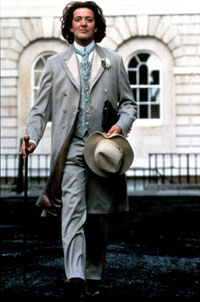On my trip to Wales I experienced another extraordinary things.
I was studing in Cambridge then, and was accustomed to the restrained way in which the English people communicate. As I approached Cardiff on the coach, I noticed that people on the streets were noticeably more relaxed and musical in their conversation.
I remember quite well an evening in a Cardiff restaurant where there were about 10 ladies at a table. They were apparently having a very good time, making pleasant noises, laughing, and sometimes even singing. Later, I was told by my English friend that that kind of activity was called a "hen night".
On the next day, I was in a small town near Cardiff, waiting for my train to the West. I went into a small pub, and there, I had the experience of my life.
There were group of people with a guitar. I think they were in their 50s. A lady was singing merry songs with a group of gentlemen. I think they had consumed a handsome quantity of alcohol, judging from the way they enjoyed themselves.
I was sitting on the stool at the counter, watching their merriment from time to time.
The lady stoop up, and walked very slowly towards me. She swung her arms in a wave-like manner. The impression of the dance was rather like that of an octopus. This species of female octopus was found in a Welsh pub, in high noon.
I thought that the lady was going to the toilet. My guess was correct. She disappeared into the ladies' room, still dancing like an octopus.
On her way to the relief, she did one extraordinary thing, however. As she passed by me, she GRABBED my private part. She held it quite strongly, for a few seconds, and went on as if nothing happened, still being a female octopus on land.
The group laughed and sang on. Grabbing done, the lady held her thumb up. Apparently it was a friendly act of greeting. Probably they had drunken too much.
When the lady reappeared from the toilet, I was still astounded, as I had never experienced something like it. The lady, still dancing like an octopus, passed by me, and this time grabbed the private part of another Welsh gentleman sitting near me at the counter. The gentleman and the lady laughed together. The whole group laughed, to the accompaniment of the guitar.
As I went out of the pub to catch my train, the people greeted me, with strokes of the guitar strings. I waved back. Not unlike an octopus. The octopus fever was contagious.
As I recall, the whole experience looks like a midsummer's dream. I was welcomed to the Welsh way of unrestrained friend-making, with a grab.
A few days later, I was back in Cambridge, back to the world of reservation and subtle smiles. Something warm lingered in me, for ever and to this day.








